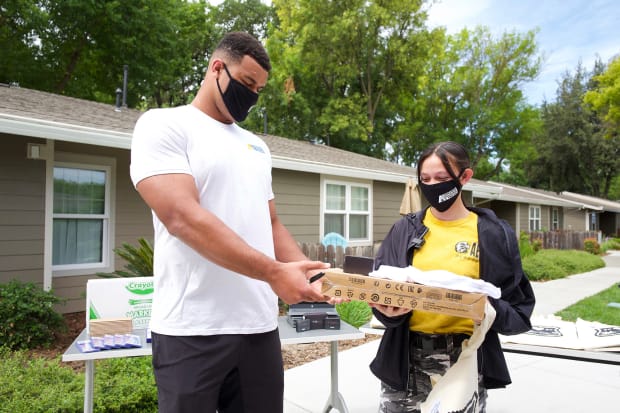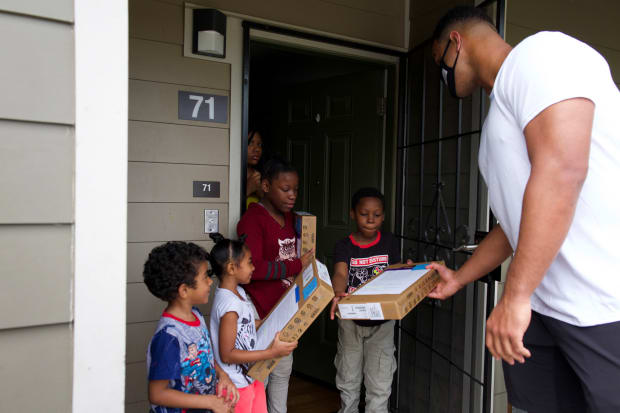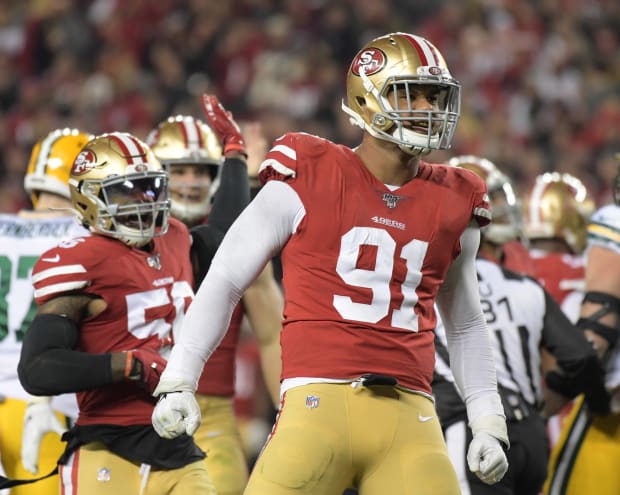San Francisco 49ers defensive tackle Arik Armstead has spent his time away from the field helping underserved children gain access to better education, especially during the coronavirus pandemic.
Leataata Floyd Elementary School is a little more than a mile from the Tower Theater, a well-known landmark in downtown Sacramento. But on one of Arik Armstead's visits to this school in his hometown, he realized that for some students, their view of the world didn’t even reach as far as a city staple that’s just a short distance away. Most students live in two affordable housing complexes adjacent to the school, he says, their daily lives largely confined to a pocket of the city tucked next to Interstate-5.
“They don't have a lot of opportunities and examples of what they could do in the future with their lives,” Armstead says. “They see the same things every day, so I wanted to work with them to try to provide some opportunities, some hope and spark some of the youths' minds there.”
When the 49ers defensive tackle started his foundation, the Armstead Academic Project, last year, he had no way of knowing what the year 2020 would bring: A global pandemic and a harsh spotlight on the systemic inequalities that exist in America. But he found himself well-positioned to help. As Armstead, a 2015 first-round draft pick, came into his own on the field, he was also searching for a focus off the field. He found himself drawn to the issue of educational inequality一an entrenched barrier to success for kids who grow up in underprivileged communities.
“When I thought about how to have the biggest impact, you look at the disparities in communities around the country, and education inequality is high on that list, in terms of creating those disparities,” he says. “I didn't think it was fair that certain students would receive poorer or lesser education due to where they live. Kids should have the same level of education. And they deserve the same shot at life, to be successful and go on to college and work in certain fields that they want to work in. So that's what I wanted to try to have an impact on.”
Armstead graduated from Pleasant Grove H.S. in a suburb of Sacramento, before continuing his education at the University of Oregon. Leataata Floyd Elementary School, a short drive away from where he grew up, receives Title 1 funding from the federal government to help support at-risk students. Armstead created his own ways to support these students. Two years ago, he took a group to a creative writing workshop, together penning a short story about a crime-fighting rapper with superpowers. He’s a regular visitor and has also hosted some of these kids at the free youth football camp he’s held at his high school for several years running.
“I believe in nurture over nature, and I feel if you can pour into people's lives, nurture them, teach them, show them the way and provide opportunities, they all have the mental capacity to be successful in the future,” he says. “But if you don't nurture them, if you don't give them opportunities, if you don't show them what's possible or give them a chance to believe in being successful, then that's what their outcome is going to be, is not successful.”
When the COVID-19 pandemic hit, the students he’d grown so close to faced an even more acute need. Schools closing presented challenges for students across the country, but particularly those without access to technology or the internet at home. More than 95% of students at Leataata Floyd also qualify for free or reduced-price meals they eat at school. After talking with Sacramento’s mayor, Darrell Steinberg, and the Sacramento City Unified School District, Armstead saw that he could help with some of these needs.

He donated $50,000 of his own money, and after mentioning the cause during an online worship with his hometown Bayside Church, raised more than $200,000 in total. Those funds were directed to Mercy Housing, the organization that runs the two housing complexes where most Leataata Floyd students live. This would cover Chromebooks, at-home internet for a year, educational kits and healthy snacks for 350 kids of all grades. A distance learning program will continue through the summer, to keep kids engaged and give those who may have fallen behind the chance to catch up.
“A lot of students had been disengaged before the pandemic, but even more so with school getting canceled and having to learn virtually and not having the technology and access,” says Armstead, who personally delivered Chromebooks to children on Monday. “I'm happy that I launched the foundation last year so that I could try to address some of these issues in my community.”
Armstead also started a virtual reading program this offseason, Storytime with Arik Armstead, where teachers can apply on the 49ers website for him to read aloud to their classroom. He’s read books like No More Noisy Nights and Making the Moose Out of Life over Zoom to elementary students in the Bay Area and Sacramento. He usually finds a way to work in both his “stay hungry” sack dance, always a hit, and a message to students to keep reading. Third grade reading skills are an important educational benchmark, he notes, correlating with how likely a child is to graduate high school on time.

“I really want others to join in on it, too, maybe other athletes or other people of influence,” he says. “It's a simple thing to do, but I think it will go a long way. Kids look up to us, and if reading is seen cool by us and the thing to do, then I think it'll engage them even more and make them want to read more and become better and better at it.”
Over the last few weeks, Armstead has also used his voice to support the Black Lives Matter movement, encouraging his social-media followers to check their own privileges and participating in a “White Coats for Black Lives” demonstration in Buffalo, where his fiancée is a psychiatry resident. In one of his posts, Armstead described the range of emotions he felt as a Black man in response to George Floyd’s dying while being brutally restrained by Minneapolis police: Sad, angry, confused, tired, doubtful, hopeful, inspired一and committed to making change.

Armstead is coming off the best season of his NFL career. He was a key piece of the 49ers defensive line in their run to the Super Bowl, and for each tackle and sack he made last season, he pledged money to his foundation, a total of $28,500. This offseason, he signed a five-year contract extension, worth up to $85 million, with the team that drafted him. The 26-year-old’s responsibilities have grown on the field一but his work this offseason demonstrates the bigger responsibility he feels off of it.
“Inequalities in all sectors and fashions have been exposed even more and they're even more apparent,” Armstead says. “Just acknowledging them is a key step, and then, if you feel a need to, to try to change them…I take it as a responsibility of mine to do that.”